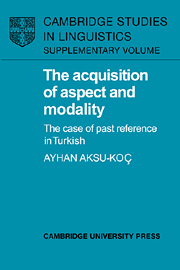Book contents
- Frontmatter
- Contents
- List of figures
- List of tables
- Acknowledgements
- Symbols and abbreviations
- PART I TENSE, ASPECT AND MODALITY IN ACQUISITION
- PART II DEVELOPMENT OF PAST REFERENCE IN TURKISH: FROM ‘PERFECT’ ASPECT TO ‘EVIDENTIAL’ MODALITY
- 4 The empirical study: rationale and hypotheses
- 5 Longitudinal study of early inflectional development
- 6 Experimental study of the production of the pasts of direct vs. indirect experience
- 7 Experimental study of the comprehension and metalinguistic awareness of the pasts of direct vs. indirect experience
- 8 Production and comprehension of the quotative function
- PART III CONCLUSIONS AND GENERAL IMPLICATIONS
- Appendix A
- Notes
- Bibliography
- Subject index
- Name index
4 - The empirical study: rationale and hypotheses
Published online by Cambridge University Press: 23 September 2009
- Frontmatter
- Contents
- List of figures
- List of tables
- Acknowledgements
- Symbols and abbreviations
- PART I TENSE, ASPECT AND MODALITY IN ACQUISITION
- PART II DEVELOPMENT OF PAST REFERENCE IN TURKISH: FROM ‘PERFECT’ ASPECT TO ‘EVIDENTIAL’ MODALITY
- 4 The empirical study: rationale and hypotheses
- 5 Longitudinal study of early inflectional development
- 6 Experimental study of the production of the pasts of direct vs. indirect experience
- 7 Experimental study of the comprehension and metalinguistic awareness of the pasts of direct vs. indirect experience
- 8 Production and comprehension of the quotative function
- PART III CONCLUSIONS AND GENERAL IMPLICATIONS
- Appendix A
- Notes
- Bibliography
- Subject index
- Name index
Summary
The present chapter will state the problem of the empirical study. First, a number of assumptions will be derived from the findings reviewed in the previous chapter. Then, specific hypotheses will be generated for the course of development in Turkish. Finally, a brief outline of the general design of the study will be presented, leaving the specifics to the relevant chapters that follow.
Some assumptions derived from the literature
The most explicit hypothesizing regarding the processes that might be involved in the course of the development of past time reference comes from Antinucci and Miller (1976). This section presents their arguments, incorporating them into certain assumptions that are suggested by the above developmental facts.
Assumption 1: The first semantic distinction that children make is that between ‘stative’ and ‘nonstative’. Depending on the available forms in their language, they use a surface marking for one or the other focus or both. The strategy exemplified in Italian- or French-speaking children's speech is the use of the past participle of transitive verbs adjectivally to comment on the present state of an object, as indicated in the following observation:
the child begins to use the past participle to describe the state of an object, and therefore treats the past participle essentially as an adjective and makes it agree with the object.
(Antinucci and Miller, 1976, p. 183)- Type
- Chapter
- Information
- The Acquisition of Aspect and ModalityThe Case of Past Reference in Turkish, pp. 51 - 64Publisher: Cambridge University PressPrint publication year: 1988



